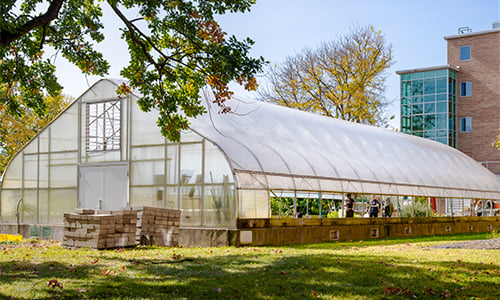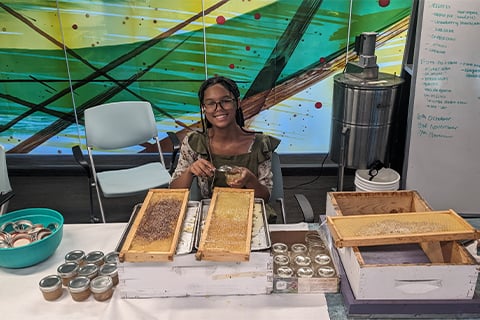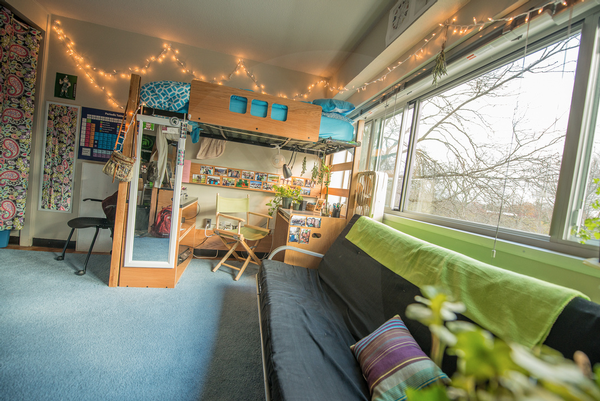RISE students learn about the principles of sustainable food production, environmental stewardship, and ecosystem resiliency. Students are encouraged to engage in a co-curricular experience to improve sustainability in their campus home or neighborhood. The ability to collaborate with interdisciplinary faculty as part of their residential experience is value added to their college education and RISE benefits from the ongoing opportunities for student engagement in solving real-world issues.
Interested?
Click the button below to start your application! You’ll be asked to share your contact info and answer two short essay questions. The application window opens November 1 and closes in mid-April.
We’ll start reviewing applications in early March, so don’t wait too long! Got questions? Reach out to Dr. Jorhie Beadle at beadlej1@msu.edu.
Explore
Living
- Bailey Hall
- Bailey GREENhouse and Urban Farm
Learning
- UGS 201: First-Year Environmental Issues Seminar
- Active Student Projects
- Prior Co-curricular Projects
Living
Bailey Hall
Bailey Hall, home to the RISE living-learning community and program, is located in the southwest corner of the Brody Neighborhood. The hall features study rooms, game rooms, offices and meeting spaces on each of the four floors. The third floor is home to the community laundry room and kitchen.
Bailey Hall originally opened during the 1956-57 school year and is named after Liberty Hyde Bailey (class of 1882). A professor of horticulture, Bailey planned the first horticulture laboratory building in the nation.
Incoming first-year students primarily live on the 2nd floor in Bailey Hall with other RISE students and have close easy access to the RISE staff and faculty (whose offices are also on the 2nd floor).
Bailey GREENhouse and Urban Farm
The Bailey GREENhouse and Urban Farm enhances the living/learning community and provides numerous engagement opportunities for RISE students. The Bailey GREENhouse is a passive solar greenhouse (also known as a hoophouse) intended for the production of certified organic produce as well as a site for numerous student projects including vermicomposting, urban farm production and management, sustainable agriculture and season extension, collaboration with campus dining, agricultural education, and apiculture.
The site surrounding the GREENhouse has been designated the first organic no-spray zone on MSU’s campus; no chemical fertilizers or pesticides are permitted on site. The Farm uses market garden-style production systems designed to produce significant quantities of produce to feed members of the MSU community. The entire landscape is edible featuring foods such as: blueberries, strawberries, rhubarb, apple, pear, paw paw, lavender, and grapes.
The hoophouse serves as a model to students of year-round vegetable production in cold climates and features such items as tomatoes, peppers, and cucumbers in the summer and salad mix, herbs, and spinach in the winter. The facility was built in partnership with Residential and Hospitality Services, Department of Community Sustainability, RISE and the Student Organic Farm, in 2012 when the RISE program was relocated to the Brody complex.
Bailey GREENhouse & Urban Farm Learning Objectives:
- Practice skills of sustainable food production under organic certification.
- Demonstrate business management skills through real-world partnerships.
- Develop an ecological care ethos within the context farm (healthy food, farmers and place).
- Analyze issues associated with a sustainable food system and food security.

The mission of the Bailey GREENhouse and Urban Farm is to provide a space of learning and growth for students of all academic backgrounds in the pursuit of a more sustainable and just food system.
Learning

UGS 201: First-Year Environmental Issues Seminar
UGS 201 is the introductory RISE seminar. All incoming first-year RISE students are enrolled in UGS 201 automatically and take the course during the fall of their first year at MSU. Students will study environmental issues within an integrated and multidisciplinary approach such that they may gain an appreciation for both the interconnectedness and also the complexity of our environment. Other topics include understanding campus resources, grant writing, community engagement projects, and strengths and career development.
Upon completion of this course:
- Students will articulate current environmental issues from an interdisciplinary approach using multiple perspectives.
- Students will gain the necessary skills to conduct environmental science and inquiry through experiential learning.
- Students will assess their skills, knowledge and values in order to make meaningful academic and career choices/plans
Active Student Projects
- Bailey Compost Initiative
- Rooftop Bees at Bailey Hall
- Vermicomposting: Worms Eat my Garbage
- Bailey Hall Green Roof
- Bailey GREENhouse and Urban Farm
- Feeding the Future: Cooking Workshops
Prior Co-Curricular Projects
- Meals for Mealworms
- Bailey Mushroom Project
- Satellite Surplus Store
- Bailey Hammock Farm
- Liberty Hyde Bailey Hydroponics
- Land Grant Goods
